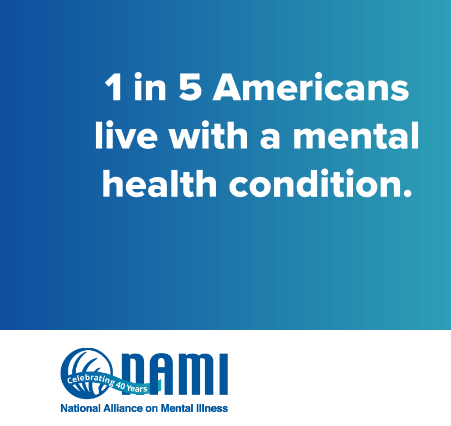
Today, NAMI joined more than a dozen of the nation’s leading mental health organizations in calling for specific additions to the next stimulus package to address the profound mental health implications of the COVID-19 pandemic. Access to critical care must be sustained for the millions of Americans living with mental health and substance use disorders, as well as those who may now need help due to isolation, grief, unemployment, increased anxiety, and more.
The COVID-19 pandemic is overwhelming our communities and our nation’s health care system, including for mental health and addiction. Congress must take immediate action to prevent the behavioral health system from collapsing and to mitigate a greater public health andeconomic crisis from untreated mental illness and addiction.
In the fourth stimulus package, the following emergency appropriations and policy changes are urgently needed.
Emergency Funding To Save Existing Treatment Infrastructure $38.5 Billion
- The National Council for Behavioral Health survey of its members estimates the Community Behavioral Health Organizations revenue could fall 50% over the next year –or approximately $38.5 billion.
- Urgent assistance is needed to maintain staff and to keep their doors open.
- Funds could be used for expenses / lost revenue attributable to COVID-19.
Emergency Funding To Expand Services For Covid-19 Response $10 Billion
9-8-8 National Mental Health and Suicide Prevention Hotline
- $300 million – Fund necessary upgrades to legacy switches to make 9-8-8 fully operational and pass H.R. 4194 / S. 2661 to formally designate 9-8-8 as hotline number.
- $80 million – Fund 9-8-8 operations to ensure capacity to handle call volume ($50 million) and crisis chat capacity ($30 million).
Maintain and Enhance Local Crisis Response
- $5.6 billion to SAMHSA Emergency Fund to:
- Provide crisis/grief counseling and other mental health needs for health care workers, first responders, grocery store workers, and others front-line workers affected by the virus. During other disasters, we deployed mental health resources to help those who were impacted on an emergency basis.
- Expand evidence-based crisis response services, including those provided by crisis providers, hotlines, mobile crisis, sub-acute crisis stabilization units and community crisis urgent care facilities.
- Expand local suicide prevention programs.
- Provide emergency grants to organizations to expand mental health and addiction virtual peer supports.
- Aid nonprofit organizations that primarily serving people with behavioral health needs and receive state/county funding that are at risk of cutting back / ending services.
- Provide behavioral health screenings, particularly for the uninsured, and utilize a universal de-identified database of population behavioral health needs based on screening results.
- Other emergency behavioral health needs as determined by the Secretary.
- $1.5 billion to HUD for homeless diversion including residential services for homeless who are increased risk from COVID-19.
- $1.2 billion to DOJ for jail diversion programs to lessen crowding in corrections facilities and the strain on state and local budgets.
- $500 million to NIMH for brain research, including relating to emerging needs in brain research relating to COVID-19.
- $800 million to HRSA for emergency workforce development, including but not limited to immediately increasing slots and paying for training for psychiatrists, psychologists, social workers, licensed mental health professionals, and certified peer specialists.
Access To Equitable Coverage
Guarantee Patient Access to Telehealth
- All health insurance plans, including all ERISA plans, Medicare and state Medicaid programs, must cover telehealth at parity with in-person care.
- Include all levels of mental health and addiction outpatient care, including intensive outpatient and partial hospitalization care, as well as other types of screening, assessment, treatment, and after-care.
- Audio-only should be fully reimbursed at the same rate as a telehealth visit to ensure that poor internet connectivity or lack of video conferencing ability by seniors and others do not inhibit access to care.
- Out-of-network restrictions and penalties should be temporarily waived for telehealth services.
Ensure Access to Medications
- Prohibit prior authorization in Medicare/Medicaid for medications to treat mental health and substance use disorders for the duration of the COVID-19 emergency.
Improve Parity Compliance (Including in Telehealth)
- Enact existing bi-partisan-supported language agreed to by Senate HELP and House Energy and Commerce to improve compliance with the Federal Parity Act.
- Consumers and providers are reporting telehealth is being covered in different ways for mental health and addiction than for medical/surgical care.
- $20 million – EBSA needs dedicated funding to verify equitable coverage of mental health and addiction services (including telehealth).
Supporters:
American Foundation for Suicide Prevention
American Psychiatric Association
American Psychological Association
The Kennedy Forum
Mental Health America
National Alliance on Mental Illness (NAMI)
National Council for Behavioral Health
Well Being Trust
2020 MOM
Addiction Professionals of North Carolina
CADA of Northwest Louisiana
California Access Coalition
California Consortium of Addiction Programs & Professionals
California Council of Community Behavioral Health Agencies
Caron Treatment Centers
Connecticut Certification Board
Eating Disorders Coalition
Illinois Association of Behavioral Health
International Certification & Reciprocity Consortium
Residential Eating Disorders Consortium
Sandy Hook Promise
Steinberg Institute










Add new comment